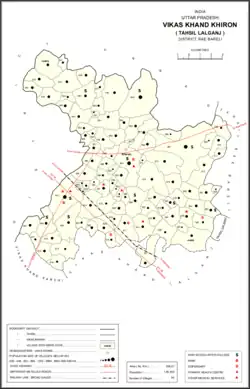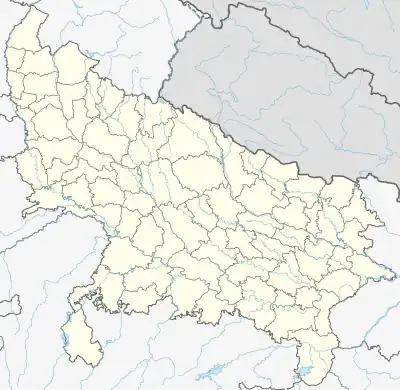Dokanha
Dokanha is a village in Khiron block of Rae Bareli district, Uttar Pradesh, India.[2] It is located 17 km (11 mi) from Lalganj, the tehsil headquarters.[3] As of 2011, it has a population of 4,009 people, in 727 households.[2] It has two primary schools and no healthcare facilities and it hosts a weekly haat but not a permanent market.[2] It belongs to the nyaya panchayat of Tikwamau.[4]
Dokanha
Dukanha, Dokanaha | |
|---|---|
Village | |
 Map showing Dokanha (#576) in Khiron CD block | |
 Dokanha Location in Uttar Pradesh, India | |
| Coordinates: 26.2697°N 80.9416°E[1] | |
| Country | India |
| State | Uttar Pradesh |
| District | Raebareli |
| Area | |
| • Total | 5.341 km2 (2.062 sq mi) |
| Population (2011)[2] | |
| • Total | 4,009 |
| • Density | 750/km2 (1,900/sq mi) |
| Languages | |
| • Official | Hindi |
| Time zone | UTC+5:30 (IST) |
| Vehicle registration | UP-35 |
The 1951 census recorded Dokanha (as "Dukanha") as comprising six hamlets, with a total population of 1,414 people (778 male and 636 female), in 187 households and 248 physical houses.[5] The area of the village was given as 1,325 acres (536 ha).[5] 50 residents were literate, all male.[5] The village was listed as belonging to the pargana of Khiron and the thana of Gurbakshganj.[5]
The 1961 census recorded Dokanha (as "Dukanha") as comprising six hamlets, with a total population of 1,657 people (823 male and 834 female), in 305 households and 270 physical houses.[6] The area of the village was given as 1,325 acres (536 ha).[6]
The 1981 census recorded Dokanha (as "Dukanha") as having a population of 2,272 people, in 428 households, and having an area of 535.81 ha (1,324.0 acres).[3] The main staple foods were given as wheat and rice.[3]
The 1991 census recorded Dokanha (as "Dokanaha") as having a total population of 2,677 people (1,306 male and 1,371 female), in 476 households and 475 physical houses.[4] The area of the village was listed as 534 ha (1,320 acres).[4] Members of the 0-6 age group numbered 729, or 27% of the total; this group was 61% male (444) and 39% female (285).[4] Members of scheduled castes made up 34% of the village's population, while no members of scheduled tribes were recorded.[4] The literacy rate of the village was 25% (529 men and 152 women).[4] 766 people were classified as main workers (618 men and 148 women), while 207 people were classified as marginal workers (all women); the remaining 1,704 residents were non-workers.[4] The breakdown of main workers by employment category was as follows: 516 cultivators (i.e. people who owned or leased their own land); 156 agricultural labourers (i.e. people who worked someone else's land in return for payment); two workers in livestock, forestry, fishing, hunting, plantations, orchards, etc.; one in mining and quarrying; 17 household industry workers; no workers employed in other manufacturing, processing, service, and repair roles; no construction workers; nine employed in trade and commerce; five employed in transport, storage, and communications; and 60 in other services.[4]
References
- "Geonames Search". Do a radial search using these coordinates here.
- "Census of India 2011: Uttar Pradesh District Census Handbook - Rae Bareli, Part A (Village and Town Directory)" (PDF). Census 2011 India. pp. 244–61. Retrieved 10 August 2021.
- Census 1981 Uttar Pradesh: District Census Handbook Part XIII-A: Village & Town Directory, District Rae Bareli (PDF). 1982. pp. 128–9. Retrieved 10 August 2021.
- Census 1991 Series-25 Uttar Pradesh Part-XII B Village & Townwise Primary Census Abstract District Census Handbook District Raebareli (PDF). 1992. pp. xxiv–xxviii, 150–1. Retrieved 22 October 2021.
- Census of India, 1951: District Census Handbook Uttar Pradesh (42 - Rae Bareli District) (PDF). Allahabad. 1955. pp. 108–9. Retrieved 22 October 2021.
{{cite book}}: CS1 maint: location missing publisher (link) - Census 1961: District Census Handbook, Uttar Pradesh (39 - Raebareli District) (PDF). Lucknow. 1965. pp. lxiv-lxv of section "Dalmau Tahsil". Retrieved 10 August 2021.
{{cite book}}: CS1 maint: location missing publisher (link)